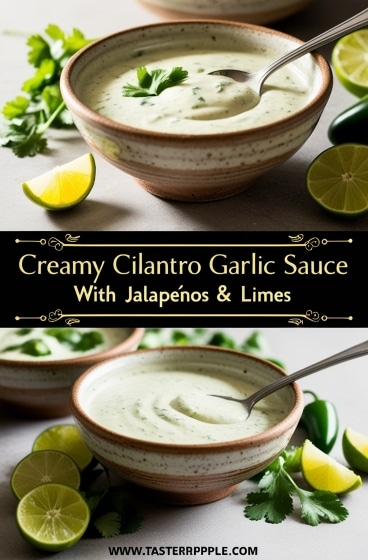I remember the first time I made this sauce, I thought I ruined it. The blender roared, the jalapeños hissed green heat into the air, and suddenly the whole kitchen smelled alive. You’d think a simple sauce wouldn’t do that, but this one does. It doesn’t just sit on the plate—it reaches out, grabs you, makes you taste it before the spoon even gets there.
This is a creamy cilantro garlic sauce with jalapeños and lime. Bright, spicy, garlicky, and yet smooth enough to cling to grilled meats or soak into warm tortillas. It’s not just another green sauce. It’s a sauce that takes cilantro’s grassy edge, garlic’s bite, jalapeño’s fire, and lime’s sharpness, then mellows it all with creaminess that turns the bold into silk.
Why this sauce matters
Cilantro garlic sauces exist in many cultures. Peru has its ají verde, Mexico uses cilantro crema, and Middle Eastern toum plays in the same field, though without the cilantro. What makes this version stand out is the balance. Not too sharp, not too heavy. It can crown tacos, drizzle over roasted potatoes, or even work as a dip for fried foods. Professional kitchens love sauces like this because they multitask. One batch can dress five different plates and taste fresh every time.
Ingredients & Substitutions
Every ingredient here has weight. Miss one, and the balance tilts. Too much garlic, the sauce bites back. Not enough lime, it tastes flat. Use old cilantro, and the whole thing gets muddy.
Here’s the base recipe:
| Ingredient | Measurement | Notes & Substitutions |
|---|---|---|
| Fresh cilantro (leaves & tender stems) | 2 packed cups | Parsley for a milder herb flavor, basil for sweeter notes |
| Garlic cloves | 3 large | Roast them if raw garlic feels too sharp |
| Jalapeños | 2 medium, deseeded for less heat | Serrano for more fire, poblano for mildness |
| Lime juice | 3 tbsp (about 2 limes) | Lemon works in a pinch, but lime keeps it brighter |
| Sour cream or Greek yogurt | 1 cup | Mayo for richer texture, cashew cream for vegan |
| Olive oil | 3 tbsp | Avocado oil works, avoid strong oils like sesame here |
| Salt | 1 tsp | Always adjust at the end—cilantro needs salt to sing |
| Water | 2–3 tbsp | To thin the sauce without extra fat |
Choosing fresh cilantro is non-negotiable. Wilted cilantro carries bitterness, not brightness. For garlic, fresh cloves are best, but roasted garlic creates a softer, caramelized depth. With jalapeños, the seeds and ribs hold most of the fire, so you can dial the heat by leaving some in.
Step-by-Step Instructions
- Prep the cilantro. Rinse it well. Dirt hides in the stems, and nothing ruins sauce faster than grit. Pat dry with a towel. If water lingers, it dilutes flavor.
- Tame the garlic. Roughly chop the cloves. Raw garlic blends strong—if you want gentler bite, blanch them for 1 minute in boiling water, or roast until golden.
- Handle the jalapeños. Slice in half, scoop out seeds and ribs if you want mild. Always wash hands after, or wear gloves—capsaicin sticks, and eye rubs later will remind you.
- Blend the base. Add cilantro, garlic, jalapeños, lime juice, and salt into a blender. Pulse until chunky, not yet smooth. This helps break things evenly.
- Add creaminess. Spoon in sour cream (or yogurt). Pour olive oil while blending. The fat emulsifies with herbs, turning harsh edges into velvet. Stop, scrape sides, then continue blending until smooth.
- Adjust thickness. Add water a spoon at a time until it flows but still coats a spoon. Too thick, it’s clumsy on food. Too thin, it slides away unnoticed.
- Taste & fix. Now comes the chef’s moment. Too sharp? Add a touch more yogurt. Too flat? Another squeeze of lime or pinch of salt. Spice not enough? Blend half a jalapeño back in.
- Rest it. Let it sit at least 30 minutes in the fridge. Flavors settle, garlic mellows, cilantro spreads out. Many sauces taste best after patience.
Common mistakes
- Over-blending cilantro. It can go bitter if you blitz too long. Pulse gently once it’s nearly smooth.
- Adding lime juice too early with cream. Acidity can split yogurt or cream if you overwork it. Add fats gradually.
- Using bottled lime juice. Always fresh. Bottled dulls the sauce instantly.
Variations
- Spicier: Add serrano or a dash of cayenne.
- Milder: Swap jalapeño for roasted poblano.
- Richer: Use mayo instead of yogurt for taco-stand vibes.
- Vegan: Cashew cream or silken tofu can replace dairy.
Cooking Techniques & Science
Why blend instead of mortar and pestle? Cilantro contains delicate chlorophyll compounds. Crushing with stone oxidizes faster, turning the sauce dull greenish-brown. A blender, when pulsed, keeps more vibrant color.
Garlic’s flavor comes from allicin, a compound that only forms when garlic cells are broken. That’s why raw garlic tastes so sharp—it releases allicin immediately. Roasting converts sugars, creating mellow sweetness. Choosing raw or roasted garlic changes not just taste but also the sauce’s chemistry.
The cream element—sour cream, yogurt, or mayo—matters because fat binds the flavor molecules from herbs and chili. Capsaicin, the heat molecule in jalapeños, is oil-soluble. Without fat, the heat feels harsher. Fat rounds edges, spreads spice evenly across the tongue. That’s why this sauce feels smooth instead of jagged.
Storage & Reheating
Store in a glass jar with tight lid. Plastic absorbs garlic aroma, which lingers forever. In the fridge, it lasts 4–5 days. After that, cilantro dulls and garlic overpowers.
Freezing? Not ideal. Dairy splits when thawed, and cilantro turns dark. If you must, freeze in ice cube trays, then whisk back with fresh yogurt when reheating. But honestly—it’s better made fresh.
Tools that help
- High-speed blender: Gets it creamy fast without overworking.
- Glass jar for storage: Maintains flavor integrity.
- Microplane for garlic (if raw): Releases maximum oils quickly.
Serving & Pairing Suggestions
Drizzle this sauce over grilled chicken, and it feels like summer suddenly sharpened itself. Tacos—especially carnitas or fish—soak it up like a gift. Roasted potatoes love it. Fried yucca, empanadas, even simple tortilla chips feel dressed for a party.
Plating matters. On a white plate, streak it across with a spoon before placing proteins on top. In bowls, swirl into soups like tortilla soup or black bean stew. Its color—bright, almost neon—adds life.
Pair it with drinks that echo freshness. A crisp lager, a mojito, even a sparkling lime agua fresca. Avoid heavy reds; they fight the cilantro.
Best Time to Serve
This sauce shines in hot weather. Cilantro and lime scream freshness that cuts through summer heaviness. But don’t box it in. Winter roasted vegetables taste less gray when this sauce shows up. For parties, make it ahead and let guests dip. It’s flexible—weekday tacos, weekend grilling, midnight snack with leftover pizza.
Conclusion
What makes creamy cilantro garlic sauce with jalapeños and lime special is not just taste but its role. It lifts plain food. It connects heat, tang, and cream into one spoonful. It’s easy but not boring, adaptable but not bland.
If I leave you one tip: always taste at the end. Cilantro changes with season, jalapeños vary wildly in heat, limes differ in sharpness. Recipes guide you, but your tongue decides the truth.
Once you master this, it becomes your kitchen’s secret handshake. A sauce that works everywhere, tastes like it belongs nowhere else.
FAQs
1. Can I make this sauce without a blender?
Yes, but texture changes. A mortar and pestle makes it chunkier, less creamy. Use a whisk if garlic is roasted and jalapeños finely minced.
2. How do I reduce the garlic bite?
Blanch cloves in boiling water for a minute or roast until golden. Raw garlic’s allicin is what bites hardest.
3. Can I use dried cilantro?
No. Dried cilantro has almost no flavor. Fresh leaves are essential. If cilantro isn’t available, parsley or basil can work, but the taste shifts.
4. What if my sauce splits?
If cream looks curdled, add a teaspoon of mayo or olive oil and blend again. Emulsification rescues it.
5. How do I make it kid-friendly?
Remove all jalapeño seeds and ribs. Add a little honey to soften acidity. Kids respond better when heat isn’t sharp.
Would you like me to push this even deeper into professional kitchen use—for example, how chefs batch it for service, cost control, and plating tricks—or keep it as a home-kitchen style article?

